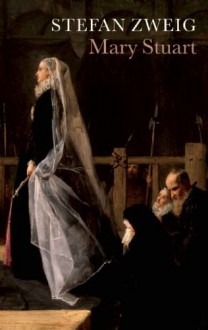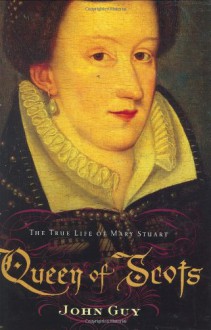
No one could guess what the soul of a woman was capable of...
- Stefan Zweig: Mary Stuart (1935)
Aroused by the differing opinions on this controversial queen, Stefan Zweig sought to illuminate the view of the legend, not within the typical frame of researching a historical figure, but by psychological profiling of the protagonist, giving this biography the uniqueness of a dramatic thriller. He would interpret Mary Stuart as a strong-willed person but easily misdirected by her passion and idealized romantic values, who carved out her own destiny with flawed judgement to her ill-fated end.
A political pawn from birth, Mary Stuart was used to secure Scotland's and France's alliance. The same year Mary married the dauphin, Elizabeth succeeded Mary Tudor as queen of England. With issues still at hand over Elizabeth's illegitimacy, all the Catholic world thus viewed Mary Stuart the rightful claimant to the throne of England. This put Elizabeth politically on guard, making the most powerful woman in Europe a dangerous adversary of Mary's.

Mary Stuart widow of Francis II
Zweig perceived the recently widowed Mary's first impression on returning to Scotland like stepping backward 100 years, leaving behind a great civilization rich and luxurious: the sensual, refined and open-minded culture of France, in exchange for a narrow-minded one, ravaged and plundered for years, which kept no palace that could receive her with the dignity befitting her rank. From the moment Mary set foot to Scottish soil, she was made to battle her most formidable religious foe, John Knox, who defied the zealous Catholic Queen's rule over Church. Zweig believed Mary came "to realize that there were limits to her royal power," and, like a heroine from his novels, gave "way to her bitterness of soul in a passion of tears."
As the country emerged through Reformation and religious conflicts; rebellion and civil wars financed to undermine the throne of the Catholic Stuarts by none other than Queen Elizabeth, Mary's survival eventually came down to the war of the cousin-queens. A life or death struggle therefore took place between them and only death was able to settle the playing field. Zweig's analysis of the two monarchs uncovered the reasons why Mary lost that struggle.
Unlike her royal cousin, Mary rose to power and good fortune quickly, a queen already in the cradle, when hardly more than a child, she was anointed a second time anticipating a second throne; whereas Elizabeth fought illegitimacy and treason, barely keeping her own head from being axed while imprisoned, eventually succeeded the throne from the half-sister who first sought to annihilate her.
Not only did they differ in their rise as monarchs, but were equally different in feminine traits; their natures "were diametrically opposed." Mary was lighthearted, possessed a surplus of self-assurance, lacked seriousness of mind and lived for her own self-needs; her mind was stuffed with romance and she accepted her queenly position as a God-given right.
Nature had not only excluded Elizabeth from motherhood - well, not voluntarily as she purported - but perforce that she remained a "virgin queen." She could neither feel, nor think, nor act unambiguously or naturally and quite incapable of yielding to complete self-abandonment. Elizabeth lived for her country, was a realist, contemplating her position as ruler and looking upon it as a profession. While Mary gave in to primal basic feminine instincts, Elizabeth learned from her past to have dominion and reserve over hers.
Passion is needed in order that a woman may discover herself, in order that her character may expand to its true proportions; love and sorrow is needed for it to find its own magnitude.
Mary innately succumbed to impulsivity and the passion of love; to be swept off her feet and swallowed up in her desires. For the sake of one moment of passionate accomplishment, she risked kingdom, power and sovereign dignity, setting a trap for herself that was planted with the conception of her husband's murder. When Zweig examined Mary's feverishly penned letter of the night of Darnley's murder, he concluded it was significant evidence of her collusion, written by a guilt- ridden person, wrestling with her conscience.
We have a vision of black thoughts fluttering through the darkness like bats. Hatred flames up between the lines; compassion overwhelms it for a moment...it is not written alertly and clearly, but confusedly and stumblingly. It is not Mary's conscious mind that is speaking, so much as an inner self, the voice of trance and fatigue and fever- the subconsciousness with which it is so hard to get into touch, the realm of feeling that knows no shame. Very few documents have been preserved that revealed so admirably as this the hyperexcitability of one who is in the course of committing a crime.
He exposed her hand in Darnley's murder like a forensic investigator in a psychological-noir, surmising that her motives were directed by reckless passion and foolhardiness, manipulated by the will of bullish persons - the likes of Bothwell. It is with this same folly and the belief in her infallibility as a sovereign that she later married Bothwell, defended him, maintaining that she could not separate herself from him: "for if she did so, his child, which she bore in her womb, would be a bastard." Regarded by this time as lightminded, she continued to live in a 'cloud', a confirmed romanticist, unable to foresee her doom as an inevitable reality.
Conspiracy and intrigue up to the very last, Mary continued to ensnare herself in a net of her own making, while Cecil and Walsingham stood by to reel her in. Mary falls as a result of the impetuosity she imperially wore like a jeweled crown.

Queen Elizabeth I
As for Elizabeth's part, Zweig diagnosed her as bipolar, hysterical, excessively theatrical, double-faced in nature; believing unequivocally that she fabricated her ignorance of the death warrant.
One of the most remarkable capacities of persons of hysterical disposition is, not only their ability to be splendid liars, but to be imposed upon by their own falsehoods. For them the truth is what they want to be true, what they believe is what they wish to believe, so that their testimony may often be the most honorable of lies, and therefore the most dangerous.
Zweig prescribes that from a political standpoint, England was right in ridding the world of Mary Stuart. Morally, however, the execution was an unjustifiable action considered in a time of peace, but more especially from one monarch by another. Although Zweig concluded that Mary Stuart was culpable of criminal actions, having never learned to act with caution or forethought, he praised her nobleness of character and called her a morally superior individual, while he condemned Elizabeth as a dissembling, political murderess. In Zweig's eyes, Mary Stuart achieved victory over Elizabeth in a spiritual sense: martyred, dying a hero's death.
We all know the historical facts surrounding Mary Stuart, the most infamous of queens; and at this point, one more biography may not yield much difference than the next, especially one as dated as this. But seldom would we find a biographer such as Zweig whose flair for dramatizing psychological behavior in his characters brought freshness to a legend.
Commendable, readable, recommended.


 Log in with Facebook
Log in with Facebook 




 Political schemes, religious partisanship and unbridled love shake the Royal Court of Scotland at the end of the Stuart dynasty.
Political schemes, religious partisanship and unbridled love shake the Royal Court of Scotland at the end of the Stuart dynasty.






